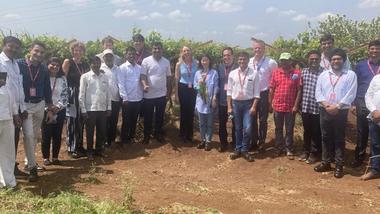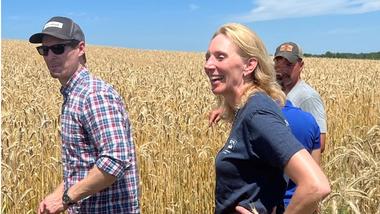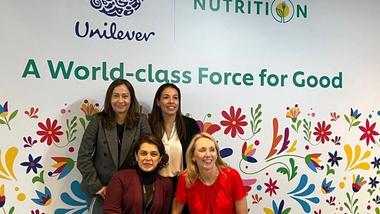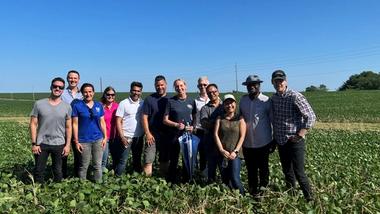
How our food brands are packing a punch for nutrition
New research confirms that a plant-based diet can provide all the nutrients we need with a little help and forward thinking
Unilever Global Change location
As President of Unilever’s Nutrition business group, Hanneke Faber is committed to winning big for the business by doing good for people and the planet.
Under her four-year leadership, first of Foods & Refreshments and then of Nutrition, Unilever’s foods business has accelerated significantly, while also securing Unilever an influential place at the table to advocate for opportunities like plant-based eating, positive nutrition, regenerative agriculture and the fight against food waste.
Have you always worked in food and nutrition?
No. I worked across various beauty roles at Procter & Gamble (P&G) for over 20 years, so beauty is where I really grew up. It was only when I was running e-commerce at the global retailer Ahold Delhaize that my love for food began.
What attracted you to working at Unilever?
I had worked with Paul Polman [former CEO of Unilever] while I was at P&G and always admired what he was doing at Unilever, both in terms of the business and in terms of reviving Unilever’s purpose of making sustainable living commonplace. It was that combination that made the offer of joining Unilever so attractive.
What do you find most rewarding about your work?
I want to win in the market. I want to grow. I want our business to grow. But I want to do that by doing good and that’s a little different from most companies who want to win and do good but on two separate tracks.
At Unilever, we really have a chance to win by doing good, and in no place is that more true than in the food business where the interests of investors, consumers and customers are so well aligned.
The things that people and the planet need from food to be healthier are the same things that will grow the business and that are good for investors.
I am also very proud of our team. We have gone from being a business that struggled to grow for many years to one that has enjoyed almost three years of high single-digit growth, every quarter – as well as industry-leading margins. But most of all, I am proud of the way we’ve done it: by being a force for good in food.
How would you describe your leadership style?
In Nutrition, we say that ‘We are All Chefs’. My leadership style very much reflects a chef’s obsession with making their customers happy and their hunger for growth.
I think I’m pretty good at setting a vision and a strategy. But I am not afraid of getting my hands dirty. I love being in factories to help improve how we operate, and in kitchens in order to get inside the head of the consumer, because without knowing what the barriers are, you cannot make progress.

What are the key differences that the Unilever reorganisation has brought?
End-to-end profit and loss responsibility is the big change. The buck stops with us. We have got no one to blame but ourselves if things go wrong and we have no one but ourselves to pat on the back when things go right… and that’s exciting.
Another big change is that factories are now part of our team. Nutrition is now run as a company and it’s a big company in its own right. We have €13 billion in sales – most food businesses are not our size.
What does it mean for decision-making and innovation?
We move faster, because there is less need to negotiate with different stakeholders. We are one team, and we can make tough choices without having to negotiate every little thing.
We are focused more on the core of our business: our big brands, our big products, our holistic superiority.
In terms of product innovation, we put our bets on the winners. We put more spend behind those innovations that have already succeeded in a few countries and expand them globally. Last year Nutrition had 20% fewer initiatives, but the average size was 50% bigger.
How are you generating value and growth?
We’re adding volume and turnover with fewer stock-keeping units (SKUs), fewer recipes and fewer materials, which means we’re increasing productivity.
We have reduced Nutrition SKUs by 20% since 2019, but our turnover is 26% bigger. In fact, we have added almost €3 billion to our turnover since 2019.

The need to scale up regenerative agriculture was highlighted at the Davos summit. How is Unilever addressing this?
Scaling up regenerative agriculture is critical for the resilience of our supply chain and therefore critical for our business. Climate change is threatening crops around the world, and we have to adapt by farming in ways that reduce emissions and water use, and improve soil health.
We have nine scaled programmes in the field today. The biggest is in Iowa, where we have 72,700 hectares of regeneratively farmed soybeans. That’s about 40% of the soybeans we use for Hellmann’s in the United States.
As we implement regenerative agriculture principles, we are seeing the positive impact with reduction in water usage, water pollution and carbon emissions – with more to come.
How do you see the regenerative agriculture programme growing?
We will massively expand. We have a Compass commitment to protect and regenerate 1.5 million hectares of land, forest and oceans by 2030.
Just in 2023, we will move from nine projects in the field to more than 40. So we are moving full steam ahead with this.
It’s not easy, as we cannot just scale up the same systems, because we are dealing with different crops, different countries, different people, different partners, different ways of funding. But it will be a key competitive advantage.
One thing I am really pleased about is that we are not the only ones who have seen the light. It is going take coalitions to combat the climate crisis and help farmers to protect healthy soils and crops for this generation and the next.
In fact, we’re working with PepsiCo on our soybean programme in Iowa. Part of regenerative agriculture depends on crop rotation. So, in Iowa, we share fields with PepsiCo, rotating between planting the soy that we need for Hellmann’s with the corn crops that PepsiCo needs for its chips.

As a business group Nutrition has set significant goals in terms of transforming food systems by 2030. How is it going?
Our overriding aim is to be Net Zero by 2039.
In order to achieve this goal, regenerative agriculture is critical. Increasing plant-based foods is critical. Stopping food waste is critical. And reducing plastic packaging is key, too.
But I also think our current commitments might not be enough. I suspect we will need to do even more and be even bolder.
Are there any brands that you would like to call on to illustrate this progress?
Both our big brands Knorr and Hellmann’s contribute significantly to our Future Food goals, as do our local jewels like Horlicks in India.
Knorr champions regenerative agriculture and has the most programmes, but Hellmann’s has the single biggest programme (soybeans in Iowa), and Bango in Indonesia is also off to the races.
Hellmann’s, of course, leads on food waste reduction, but the entire portfolio contributes. And in plant-based foods, the Vegetarian Butcher and Unox are stars, but we have also seen big volumes from Knorr, where animal-based ingredients in products like soups and bouillons are being replaced with plant-based ones.

Were you pleased with Nutrition’s 2022 results?
Absolutely. We overdelivered on the top line. We overdelivered on cash. We delivered our bottom-line numbers.
Was there anything that has been a particular highlight?
2022 shows that we now have a really attractive global portfolio. After the significant mergers and acquisitions of the last few years, we play in attractive categories with above-average growth and margins around the world: Condiments, Dressings, Snacking and Functional Nutrition. And in those attractive spaces, we have power brands with superior products that are hard to beat.
Hellmann’s grew 20%+ and Knorr grew 7%, which really shows the power of big brands. These two alone added about a €1 billion of turnover in just a year. And then, we have some smaller brands with a lot of potential. Maille in dressings, the Vegetarian Butcher....
I was also excited by the operational progress we’re making, as highlighted by our first digital lighthouse factory in Tianjin, China.
The results show Unilever Food Solutions almost back at pre-pandemic volume despite a decline in China. What do you think fuelled their success?
UFS is helped by being a global business and one team with leading capabilities in the Away from Home channel. In the beginning of the pandemic, China grew while the rest of the world was closed. In 2022, the opposite happened, and the US and Europe have led growth.
I love how Star Chen [EVP of Unilever Food Solutions] and his team drive this business with a simple recipe: provide superior solutions for chefs and grow through digital selling.

Looking to the future, how important will partnerships in the alternative proteins space be for the Nutrition portfolio?
I think alternative proteins will be key and we already have some really interesting partnerships. For example, we’re working with Algenuity on developing algae-based proteins and with Enough to do the same with natural fungi.
I think we can expect to see these ingredients showing up in our products in the not-too-distant future.
How will Nutrition continue to innovate and grow sustainably in this marketplace?
We are fortunate to be based at the centre of global food innovation: Holland’s ‘food valley’. And to have our global R&D centre, known as the Hive, on the campus of Wageningen University, the world’s No.1 food and agriculture university. This is unique and will help.
What do you consider to be the next big trend in nutrition?
I think the next big trend has to be Net Zero. However, it will require a lot of creativity and a lot of innovation in order to be able to deliver really delicious, easy and affordable net-zero options.
Finally, if you could ask a fellow business group leader a question, what would it be?
I would ask Graeme Pitkethly, Chief Finance Officer: ‘What action will it take to grow the share price?’

New research confirms that a plant-based diet can provide all the nutrients we need with a little help and forward thinking

Nutrition Strategy Director, Maxim Yermolayev and Ice Cream Innovation Lead, Fatma Tek share their expert insights into five consumer behaviours and food trends that will see more people making plant-based eating part of their daily diet in 2023.

Cutting business waste is just one of the ingredients in Unilever Food Solutions’ recipe for a waste-free future. We spoke to chefs Alex Hall in the UK, Audrey Crone in Ireland and Mary Worthington in South Africa to find out how they’re helping reduce waste and increase profit margins in the process.